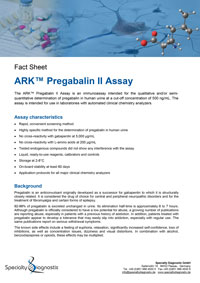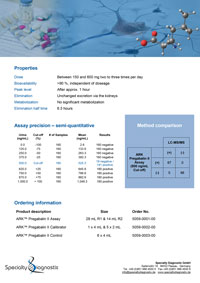The Pregabalin II Assay from ARK Diagnostics, Inc. is a homogeneous enzyme immunoassay for the qualitative and semi-quantitative determination of pregabalin in human urine. This assay is a fast, sensitive and convenient alternative to the more time-consuming chromatographic methods to establish misuse or abuse of pregabalin and may be easily integrated into existing drugs of abuse screening procedures.
ARK™ Pregabalin II Assay
Assay Characteristics
- Rapid, convenient screening method
- Highly specific method for the determination of pregabalin in human urine
- No cross-reactivity with gabapentin at 5,000 µg/mL
- No cross-reactivity with L-amino acids at 200 µg/mL
- Tested endogenous compounds did not show any interference with the assay
- Liquid, ready-to-use reagents, calibrators and controls
- Storage at 2-8°C
- On-board stability at least 60 days
- Application protocols for all major clinical chemistry analyzers

Background
Pregabalin is an anticonvulsant originally developed as a successor for gabapentin to which it is structurally closely related. It is considered the drug of choice for central and peripheral neuropathic disorders and for the treatment of fibromyalgia and certain forms of epilepsy.
92-99% of pregabalin is excreted unchanged in urine. Its elimination half-time is approximately 6 to 7 hours. Although pregabalin is officially considered to have a low potential for abuse, a growing number of publications are reporting abuse, especially in patients with a previous history of addiction. In addition, patients treated with pregabalin appear to develop a tolerance that may easily slip into addiction, especially with regular use. The same publications report on serious withdrawal symptoms.
The known side effects include a feeling of euphoria, relaxation, significantly increased self-confidence, loss of inhibitions, as well as concentration issues, dizziness and visual distortions. In combination with alcohol, benzodiazepines or opioids, these effects may be multiplied.





